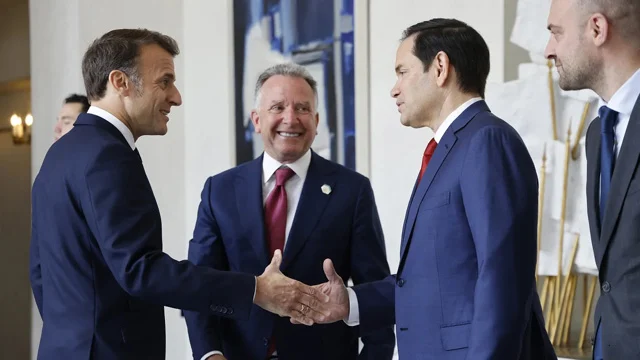France praised a fresh round of high-level discussions on the Ukraine conflict, calling the talks a “positive process” as European and American officials met in Paris to explore potential pathways toward a ceasefire in the ongoing war.
The diplomatic meetings, held Thursday, brought together French President Emmanuel Macron, US Secretary of State Marco Rubio, US envoy Steve Witkoff, British Foreign Secretary David Lammy, German representatives, and Ukrainian ministers. The initiative marks a concerted effort by Europe to take an active role in peace negotiations, amid growing pressure to end the war that has raged for over three years.
“Today in Paris, we launched a positive process in which the Europeans are involved,” the French presidency said in a statement, highlighting the importance of European inclusion in shaping any future peace framework.
A follow-up meeting between representatives from the US, UK, France, Germany, and Ukraine is scheduled to take place in London next week, signaling a commitment to continued diplomatic engagement.
Rubio also reached out to Russian Foreign Minister Sergei Lavrov to brief him on the Paris discussions. According to the US State Department, Rubio reiterated Washington’s desire for a “durable and lasting peace” and said the Paris talks indicated that peace was within reach—if all parties engage in good faith.
Lavrov, in response, reaffirmed Moscow’s willingness to work with Washington to address the root causes of the crisis. Russia’s foreign ministry emphasized the importance of maintaining direct lines of communication ahead of next week’s London talks.
Ukrainian President Volodymyr Zelensky welcomed the renewed dialogue, stressing the need for clarity and unity. “It is important that we hear each other, refine and clarify our positions, and work for the sake of real security for Ukraine and all of Europe,” he said in a post on social media platform X.
Despite the cautious optimism, the Kremlin downplayed the significance of the Paris meeting. Spokesman Dmitry Peskov claimed that European officials appeared more focused on prolonging the conflict than resolving it.
France and the UK have been vocal about the need for a coordinated European role in any ceasefire arrangement, especially after former President Donald Trump’s administration began direct talks with Russia earlier this year. The recent shift in US leadership has raised questions about the direction of American policy, particularly as Trump’s peace push appears to face resistance from Moscow.
French Foreign Minister Jean-Noel Barrot described the Paris talks as a breakthrough, noting that it was the first time the US, Ukraine, and European powers had come together in such a unified setting. “The United States has understood that a just and sustainable peace can only be achieved with the consent and contribution of Europeans,” he said.
Tensions persist, however, over differing views within the Western alliance. Zelensky recently criticized US envoy Steve Witkoff for allegedly echoing Russian talking points after Witkoff suggested that a peace deal could depend on the status of Russian-occupied territories. “It is very dangerous,” Zelensky warned, accusing Witkoff of “consciously or unconsciously spreading Russian narratives.”
Witkoff, who has met with Russian President Vladimir Putin multiple times since Trump’s return to the White House, claimed earlier this week that Putin is open to a “permanent peace” deal—though recent Russian airstrikes on Ukrainian cities have heightened calls for a stronger diplomatic push.
With momentum building for renewed negotiations, all eyes now turn to London, where the next round of talks could signal whether this “positive process” has the potential to evolve into concrete progress toward peace.



